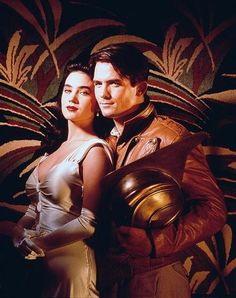It should have come as no surprise to me that The Rocketeer and Captain America: The First Avenger were directed by the same person. I spotted the similarities in the theater—I actually saw both of them in the theatre. Joe Johnston has not, I have to say, had the greatest career. He’s directed a whopping ten movies, including Jurassic Park III and Honey, I Shrunk the Kids. However, if you look at his actually good movies, or even his mediocre ones with a better visual style, what they have in common is that they are all period pieces.
I love a good period piece. There are some stories that are just better told in an older time. For our first two examples, let us consider the worlds these characters inhabit, because they’re both good examples of when the period piece works best. Then, we’ll talk about a few proposed remakes that, if we must have them, we should make as they ought to be done, not modernized.
The Rocketeer didn’t just need to be a period piece because Howard Hughes invented the rocket. I mean, for all it really matters to the plot, Tony Stark could have invented the rocket. That’s not the point. There are a few other things that do matter. I must admit that one of them is the visual aesthetic; the Rocketeer just works best in Art Deco. For the plot, though, an important consideration is the political feel of the times. Without Nazis, the Rocketeer is just another superhero. Not even a particularly good one, if we are being honest. He’s got a jet pack, but he needs a gun and isn’t particularly strong or bulletproof or agile or anything. He’s not a great detective. But he’s an All-American Boy who can strap a jet onto his back and fight Nazis, and that only works if you stick him in the mid ’30s. Any other era and any other villain, it’s frankly kind of dumb.
As for Cap, well, the creation of Captain America in-universe also pretty well relies on the Nazis. It has to be long enough ago, for example, that you don’t have a lot of pesky review boards telling you that you can’t use untried serum on human subjects. Spider-Man dodges that by having Norman Osborne use the stuff on himself, but it’s the reason The Experiment, a 2010 movie about the Stanford Prison Experiment fails. (Or one of them, anyway; it’s not a very good movie on several levels.) They didn’t make it a period piece, and all you can think is, “How did they get away with doing this experiment?” With Cap, you know they got away with it because it was the ’40s, and a patriotic boy would do just about anything to help fight the Nazis.
I have, over the years, seen plenty of movies that would have worked better as period pieces, often because the plot relied on attitudes that were anachronistic or events that go against one established practice or another but wouldn’t in another era. It somehow doesn’t work when all those classic books in movies made in the ’30s were still set in the ’30s; sometimes, a fantasy time that isn’t modern or period works, but more often, it’s just an awkward mess.
Now, I heard the other day that Robert Downey, Jr., is hoping to get a Perry Mason movie made. I have not only seen probably the entire series at one point or another, I have read quite a few of the books. I know a good deal about the character, and I’m hesitantly approving. Okay, so he’s too old—Perry is, in my opinion, probably in his late thirties or early forties, though I don’t think it ever says—but that doesn’t seem to matter if you’re a male actor. And, yes, a lot will depend on who they cast as Della, Paul, and so forth. However, I hear he does indeed plan to make it a period piece, and that’s great. There are nuances in the books that didn’t make it into the TV show because of when it was made. I believe they can now, and they’d be lost if you set them in a time when it didn’t matter if Della got married or not when it came to expectations about her career.
Similarly, I’ve heard vague noises about a remake of The Thin Man, and that simply wouldn’t work in a modern setting. How could Wynant completely disappear in this day and age? No hits on his credit cards? No appearance on social media? No being caught in someone else’s pictures? No, that doesn’t work. It’s a lot harder to drop completely out of touch now than it was in 1934. Even if you want to.
There are good and bad adaptations when it comes to choosing not to do the period piece. I actually happen to like the Baz Luhrmann Romeo + Juliet. On the other hand, you couldn’t do a modern reimagining of The Great Gatsby, and just sticking in a bunch of modern trappings isn’t at all the same thing. It still needs to be explicitly the Roaring Twenties in order for everything going on to hang together. It’s not a failing of a work to be better set in a specific period or admirable for being more universal, necessarily. It just makes them different. I admire when people making an adaptation know enough to know when something, yes, just needs to be set in a specific time and work within that framework.

